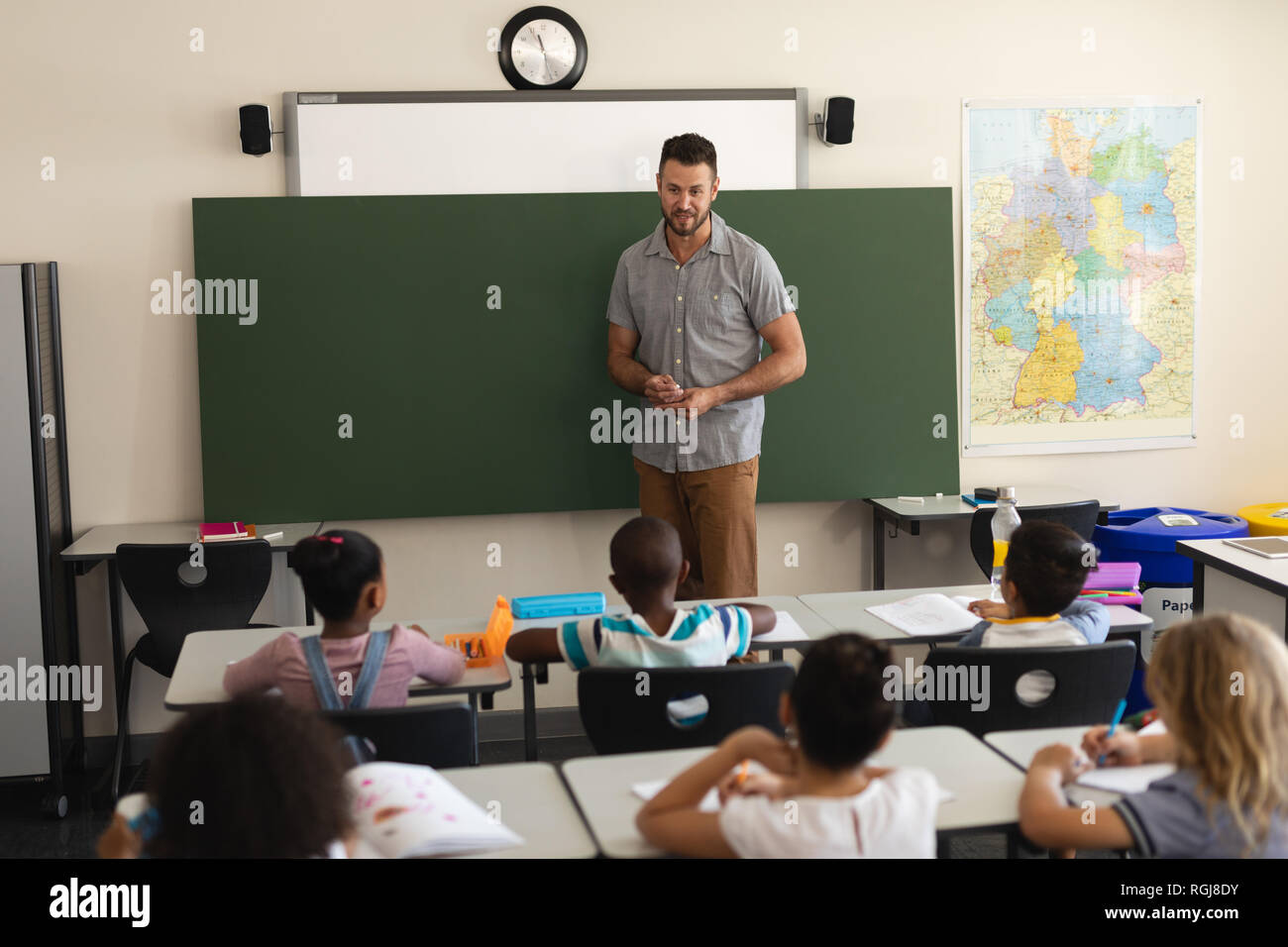Achieve Academic Success with Primary Science Tuition Singapore
Achieve Academic Success with Primary Science Tuition Singapore
Blog Article
Exploring the Different Mentor Methods in Primary Science Education And Learning Today
Inquiry-based knowing, hands-on experiments, and the combination of modern technology are redefining exactly how educators engage young minds. Furthermore, collaborative strategies and set apart guideline are being employed to provide to the varied needs of students, enhancing both interaction and understanding.
Inquiry-Based Knowing
Inquiry-Based Learning (IBL) is an instructional strategy that urges pupils to explore scientific principles via wondering about, investigation, and hands-on experimentation. This approach stresses the function of pupils as energetic individuals in their knowing, advertising important thinking and problem-solving skills. By involving with real-world questions, students come to be determined and interested, which enhances their understanding of clinical concepts.
In IBL, educators function as facilitators, leading students as they browse their queries rather than supplying info directly. This student-centered technique permits distinction, accommodating various discovering speeds and styles. Trainees create abilities in developing theories, designing experiments, and analyzing information, which are essential for scientific literacy.
Additionally, IBL promotes cooperation among students, urging them to share concepts and findings. This cumulative query advertises social abilities and a sense of neighborhood within the class. The procedure of inquiry motivates durability, as students learn to welcome failure as a stepping stone toward understanding.
Hands-On Experiments
Hands-on experiments are an important element of effective scientific research education and learning, complementing the principles of inquiry-based discovering. These experiments permit pupils to involve straight with clinical principles, promoting a deeper understanding through experiential knowing. By controling products and observing results, young students can grasp abstract concepts in tangible ways.
Such activities promote important reasoning and analytic skills, as pupils hypothesize end results, conduct experiments, and assess outcomes. This process motivates them to ask concerns, refine their understanding, and develop a clinical frame of mind. Hands-on experiments can be tailored to varied knowing designs, making certain that all students have the opportunity to involve meaningfully with the content.
In addition, hands-on experiments often motivate collaboration amongst peers, promoting team effort and communication abilities. Operating in groups makes it possible for students to share ideas, review searchings for, and discover from each other, which boosts their general academic experience.
Incorporating hands-on experiments into the key science educational program not only improves the learning atmosphere yet also grows a lifelong rate of interest in scientific research. By actively participating in their education and learning, trainees are most likely to create an enthusiasm for scientific questions that prolongs beyond the class.

Modern Technology Combination
Incorporating innovation into key science education has actually become progressively important in promoting pupil involvement and enhancing learning outcomes. Using electronic devices, such as interactive simulations, virtual laboratories, and educational software, provides pupils with opportunities to discover clinical ideas in ingenious ways. These resources promote a deeper understanding of complex subjects by allowing students to visualize and adjust variables that would certainly be not practical in a conventional classroom setup.
Furthermore, technology combination motivates individualized finding out experiences. Students can progress at their own rate, taking another look at difficult concepts with multimedia sources, which cater to various knowing designs. This flexibility not only sustains specific growth but likewise grows a feeling of freedom in students.
Additionally, modern technology functions as a bridge to real-world science, attaching trainees with current study and specialist payments. Accessibility my review here to on the internet data sources and clinical journals widens trainees' viewpoints on scientific query and cultivates essential assuming abilities.
Collaborative Knowing
Joint knowing plays an important duty in primary redirected here scientific research education and learning by promoting synergy and interaction abilities among students. This method urges students to collaborate, share expertise, and take part in problem-solving, which boosts their understanding of clinical principles. By getting involved in group activities, students learn to articulate their ideas, pay attention to diverse perspectives, and discuss solutions, all of which are necessary abilities in both scholastic and real-world contexts.

Research shows that collaborative understanding can result in raised inspiration and interaction in scientific research subjects, as trainees locate enjoyment in common experiences (primary science tuition Singapore). Additionally, this technique prepares pupils for future collaborative undertakings, furnishing them with the abilities necessary for effective team effort in college and professional environments. Eventually, accepting collaborative understanding in primary science education can substantially enrich the discovering experience and advertise a much deeper understanding of clinical questions
Separated Instruction

Differentiated instruction can manifest in various ways, such as varying the web content, procedures, or products of knowing. Instructors may use tiered assignments that provide differing degrees of intricacy, enabling students article to function at their corresponding readiness levels. Additionally, adaptable organizing techniques can promote cooperation among pupils with various abilities, fostering peer knowing.
Assessment plays a vital role in this technique, as it notifies instruction and aids teachers understand each trainee's distinct needs. Formative analyses, such as quizzes and monitorings, can lead instructors in readjusting their techniques to boost discovering end results. primary science tuition Singapore. Inevitably, by executing differentiated direction in primary science education, instructors can cultivate a much more efficient and fair discovering setting, empowering all trainees to reach their complete potential in recognizing scientific phenomena
Final Thought
In recap, the varied mentor approaches in main scientific research education and learning, including inquiry-based discovering, hands-on experiments, technology combination, joint understanding, and differentiated instruction, jointly contribute to a more efficient discovering setting. These approaches promote essential reasoning, problem-solving skills, and a deeper comprehension of clinical ideas. By carrying out these approaches, instructors can develop engaging and supportive class that attend to the diverse needs of pupils, inevitably cultivating a lifelong rate of interest in science and improving academic accomplishment.
Inquiry-Based Knowing (IBL) is a pedagogical technique that motivates trainees to explore clinical principles through doubting, investigation, and hands-on experimentation.Joint learning plays a crucial role in main scientific research education and learning by cultivating teamwork and communication abilities among students.Research suggests that collaborative learning can lead to raised motivation and interaction in science topics, as trainees find pleasure in shared experiences.In promoting an inclusive discovering atmosphere, distinguished guideline arises as a vital technique to suit the diverse demands and abilities of trainees in primary scientific research education. Eventually, by implementing separated direction in key science education and learning, educators can cultivate a much more equitable and efficient knowing setting, encouraging all students to reach their full possibility in understanding scientific sensations.
Report this page